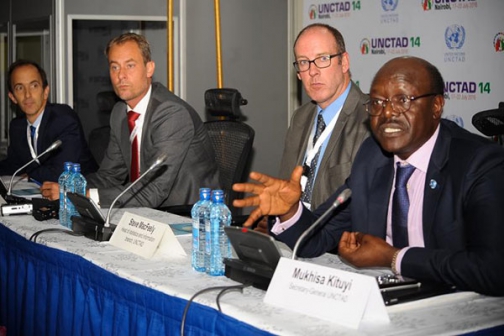NAIROBI: Non-tariff measures are wiping off a tenth of exports from developing countries. The United Nations has said developing countries are losing about $23 billion (Sh2.3 trillion) every year to rich nations through their failure to comply with non-tariff measures.
Data released by the United Nations Conference on Trade and Development (UNCTAD) says the losses, which are equal to about 10 per cent of their exports, are lost to the Group of 20 (G20) through failure to comply with G20 non-tariff measures.
Non-tariff measures cover a broad range of legitimate and important policy instruments, including measures to protect the health of a country’s citizens and its environment, too. For example, non-tariff measures may limit the use of pesticides in food. But as tariffs have fallen to historic lows, non-tariff measures have replaced them as a key brake on faster global trade growth.
And the expansion of the middle class in many countries is expected to increase demand for safer and cleaner products. This, in turn, may require governments to introduce more non-tariff measures. “These kinds of measures are becoming increasingly widespread,” said UNCTAD Deputy Secretary-General Joakim Reiter.
“For example, measures on the cleanliness and pathogen-free status of food – known as sanitary and phytosanitary measures – cover more than 60 per cent of agricultural trade.” This comes at a time when pressure is mounting on the richer countries to honour their promises at the conference.
Already, UNCTAD says developed nations failed to remit Sh200 trillion they had promised developing countries in the last decade a failure that had impacted heavily on the development agenda of vulnerable states. The United Nations said developing countries would be better able to finance the Sustainable Development Goals if rich countries were meeting their 2002 target to put 0.7 per cent of gross national income into overseas aid.
“The Sustainable Development Goals represent the outcome of long, serious discussions on how we want our world to look in 2030, but this vision needs serious finance,” UNCTAD Secretary General Mukhisa Kituyi said.
Dr Mukhisa was speaking at the launch of a new report, Development and Globalisation: Facts and Figures, which said if rich countries had consistently met the 0.7 per cent target since 2002, developing countries would have been $2 trillion (Sh203 trillion) better off.
UNCTAD also launched a database to list the non-tariff measures of 56 countries, covering 80 per cent of world trade. The database allows policymakers to search by country and product to find out quickly the relevant non-tariff requirements.
Free Trade Area
“This database will improve countries’ ability to understand the regulatory requirements, helping them to comply more easily and at less cost,” said Guillermo Valles, Director of the Division on International Trade in Goods and Services, and Commodities.
Policymakers can use the database, for example, to harmonise their regulations and accelerate the growth of regional trade. The African Union has already requested that UNCTAD support them with the Continental Free Trade Area by setting up a similar database. This database will provide the necessary information on non-tariff measures so that negotiators can harmonise their regulations, cutting the costs of trade.
Low-income countries tend to be disproportionately affected by non-tariff measures. Their companies are smaller and so the non-tariff measures, which have fixed costs, become disproportionately more expensive.
“Use non-tariff measures to protect your citizens, but don’t let them compromise trade because that will block economic growth and job creation.”
 The Standard Group Plc is a
multi-media organization with investments in media platforms spanning newspaper
print operations, television, radio broadcasting, digital and online services. The
Standard Group is recognized as a leading multi-media house in Kenya with a key
influence in matters of national and international interest.
The Standard Group Plc is a
multi-media organization with investments in media platforms spanning newspaper
print operations, television, radio broadcasting, digital and online services. The
Standard Group is recognized as a leading multi-media house in Kenya with a key
influence in matters of national and international interest.
 The Standard Group Plc is a
multi-media organization with investments in media platforms spanning newspaper
print operations, television, radio broadcasting, digital and online services. The
Standard Group is recognized as a leading multi-media house in Kenya with a key
influence in matters of national and international interest.
The Standard Group Plc is a
multi-media organization with investments in media platforms spanning newspaper
print operations, television, radio broadcasting, digital and online services. The
Standard Group is recognized as a leading multi-media house in Kenya with a key
influence in matters of national and international interest.






